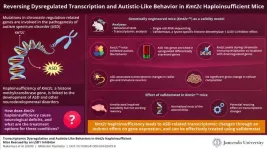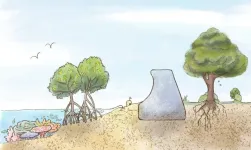(Press-News.org) Virtue is a normative concept comprising a set of moral and social codes acceptable to society. Historically, in the West, especially in ancient Greek and Christian belief systems, virtue was viewed as "excellence" aspirational to all human beings. In contrast, the East, especially in a Confucian belief system, viewed it similarly but being aspirational to only select individuals, such as rulers. However, the rise of modern values and sociopolitical overhauls almost pushed the concept of virtue into oblivion.
In the 20th century, however, virtue was resurged in academic fields, yet it remained relatively dormant in the public consciousness. Virtue impacts society in multiple ways—it is a concept commonly found in many cultures, associated with psychological and sociological studies, and reflected in the educational curricula of a country. Given that the notion of virtue has a multitiered impact on society, exploring potential perception differences between educational specialists (ESs) and the general public (GP) is the need of the hour.
A recent study published in Frontiers in Psychology on 15 February 2024 explored these gaps in multicultural Japanese society. The study, conducted by Dr. Koji Tachibana and Dr. Eisuke Nakazawa, revealed that the concept of virtue was relatively unknown to the GP compared to ESs. The results also showed significant differences in how the GP and ESs perceive virtue. The GP identified with passive, emotional virtues, whereas the ESs identified with active, intellectual virtues. Notably, both groups thought positively of virtue but poorly understood the Confucian concept of virtue.
Dr. Tachibana underscores the significance of the research, stating, "If there is a gap between the GP and ESs on the subject of virtue, where ESs frame discussions or publish textbooks neglecting this gap, they could contain errors in theoretical and empirical research on the concept of virtues and deter the actual design of an education system. Thus, we sought to endeavor on theoretical and practical perspectives to address the gaps between the GP and ESs groups in understanding virtue."
Accordingly, the team conducted an online survey in Japan targeting both groups. They recruited individuals of various ages and genders for the GP group and individuals from academic societies related to philosophy and education for the ES group. Subsequently, they evaluated the responses for the frequency of encountering the term "virtue" in daily life, the impressions associated with virtue, words associated with virtue, virtues that are difficult to understand, and virtues deemed important to either group.
Notably, the researchers arrived at five main conclusions: Firstly, the ES group was more familiar with the term "virtue" when compared to the GP group. Secondly, both groups held positive impressions of virtue. Thirdly, ESs tend to associate more with ancient Greek virtues, although both groups acknowledged Buddhist elements. Fourthly, there existed a mutual lack of understanding of Confucian virtues. Lastly, differences existed in the emphasis on virtues—the GP leans towards Eastern values while ESs toward Western ones.
These findings reveal that the notion of virtue was being perceived differently by different members of society. Practically, this points to the possibility of a gap in the understanding of the notion of virtue among ESs, which, if neglected, can have negative practical implications. The authors believe that since the ESs hold the power to influence the national curriculum, formulate educational policies, and authorize textbooks in the educational system, they must exercise caution in using the notion of virtue. On the contrary, not exercising caution in doing so could have a detrimental impact on the education system.
Sharing his closing thoughts on the study, Dr. Tachibana says, "Our study showed that ESs and the GP understood virtue differently in Japan. This finding has several social implications in areas such as academic integrity and educational policy." Indeed, the findings of this study could serve as a trailblazer for future studies about the concept of virtue in society.
About Associate Professor Koji Tachibana
Associate Professor Koji Tachibana specializes in philosophy at the Faculty of Humanities, Chiba University, Japan. He is also an international associate scholar at Georgetown University Medical Center since 2015. Dr. Tachibana investigates the notion of virtue from four perspectives: ancient Greek philosophy, contemporary virtue ethics, Japanese philosophy, and philosophy of science.
END
Virtue in Japan: perception differences among educational specialists and general public
Researchers explore the notion of virtue in Japan, with potential implications for both academic integrity and educational policy
2024-04-09
ELSE PRESS RELEASES FROM THIS DATE:
New study uncovers how altered gene expression can induce autism
2024-04-09
Autism spectrum disorder (ASD) encompasses neurodevelopmental conditions where patients display repetitive behavior and impaired sociality. Genetic factors have been shown to influence the development of ASD. Additionally, recent studies have shown that the genes involved in chromatin modification and gene transcription are involved in the pathogenesis of ASD. Among the many genes implicated in this process, the gene KMT2C (lysine methyltransferase 2c), which codes for a catalytic unit of H3K4 (histone H3 lysine 4) methyltransferase complex, has been identified to be associated with the development ...
Targeting RAS proteins may prevent relapse in Acute Myeloid Leukemia
2024-04-09
Relapses in a common form of leukemia may be preventable following new research which has identified how the cancer develops resistance to first line treatments.
New research published in iScience by researchers from the University of Birmingham, the Institute of Cancer Research (ICR), Newcastle University, the Princess Maxima Centre of Pediatric oncology and the University of Virginia identified changes in a mutated form of acute myeloid leukemia (AML) samples from patients who relapsed after receiving FLT3 inhibitor treatment.
The team found that the resistant cancer had up-regulated multiple other signalling pathways to overcome the drug’s action, and ...
What’s quieter than a fish? A school of them
2024-04-09
Swimming in schools makes fish surprisingly stealthy underwater, with a group able to sound like a single fish.
The new findings by Johns Hopkins University engineers working with a high-tech simulation of schooling mackerel, offers new insight into why fish swim in schools and promise for the design and operation of much quieter submarines and autonomous undersea vehicles.
“It’s widely known that swimming in groups provides fish with added protection from predators, but we questioned whether it also contributes to reducing their noise,” said senior author Rajat Mittal. “Our results suggest that the substantial decrease in ...
Growth mindset messages can close grade gap for first-generation students
2024-04-09
PULLMAN, Wash. – Just two emails, at the right time with the right message, can make a big difference for students who are the first in their families to go to college.
A recent Washington State University study highlighted the power of an instructors’ growth mindset -- the belief that abilities are not innate but can be improved. Researchers found that when first-generation students in an introductory science course received growth mindset emails after their initial exams, they did better in the whole course than a control group.
On average the students raised their final grade by about a third of a letter grade, such as moving ...
After being insulted, writing down your feelings on paper then getting rid of it reduces anger
2024-04-09
A research group in Japan has discovered that writing down one's reaction to a negative incident on a piece of paper and then shredding it or throwing it away reduces feelings of anger.
“We expected that our method would suppress anger to some extent,” lead researcher Nobuyuki Kawai said. “However, we were amazed that anger was eliminated almost entirely.”
This research is important because controlling anger at home and in the workplace can reduce negative consequences in our jobs and personal lives. Unfortunately, ...
A natural touch for coastal defense
2024-04-09
Common “hard” coastal defenses, like concrete sea walls, might struggle to keep up with increasing climate risks. A new study shows that combining them with nature-based solutions could, in some contexts, create defenses which are better able to adapt. Researchers reviewed 304 academic articles on the performance of coastal defenses around the world, including: natural environments; soft measures (which support or enrich nature); hard measures (such as concrete sea walls); and hybrids of ...
Remote work cuts car travel and emissions, but hurts public transit ridership
2024-04-09
Remote work could cut hundreds of millions of tons of carbon emissions from car travel – but at the cost of billions lost in public transit revenues, according to a new study.
Using the latest data on remote work and transportation behavior since the pandemic upended work arrangements, researchers at the University of Florida, the Massachusetts Institute of Technology and Peking University revealed how cities could meet their sustainability goals by promoting remote work.
The researchers found that a 10% increase in remote workers could lead ...
Better battery manufacturing: Robotic lab vets new reaction design strategy
2024-04-09
Images // Video
New chemistries for batteries, semiconductors and more could be easier to manufacture, thanks to a new approach to making chemically complex materials that researchers at the University of Michigan and Samsung's Advanced Materials Lab have demonstrated.
Their new recipes use unconventional ingredients to make battery materials with fewer impurities, requiring fewer costly refinement steps and increasing their economic viability.
"Over the past two decades, many battery materials with enhanced capacity, charging speed and stability ...
Electroconvulsive therapy (ECT) shown to reduce severity of certain mental illnesses
2024-04-09
Researchers have found that Electroconvulsive Therapy (ECT), where an electric current is passed through the brain, can reduce the severity of mental illnesses.
ECT is a safe and effective treatment for some mental illnesses including severe/psychotic depression, postnatal psychosis and mania.[1],[2] Patients are placed under general anaesthetic and the brain is stimulated with short electric pulses.[3] This causes a brief seizure which lasts for less than two minutes.[3]
The use of ECT across Scotland was assessed over an 11-year period from 2009 to 2019 using data from the Scottish Electroconvulsive Therapy (ECT) Audit Network (SEAN). The Scotland-wide ...
Lonely children more likely to experience psychosis, new study finds
2024-04-09
A new study suggests that children who felt lonely for more than 6 months before the age of 12 are more likely to experience an episode of psychosis than children who did not, with women more affected than men.
Psychosis refers to a collection of symptoms that affect a person’s mind, where there has been some loss of contact with reality.[1] During an episode of psychosis, a person may have difficulty recognising what is real and what is not.[1] Symptoms of psychosis include hallucinations, delusions and confused thoughts.[2] In some instances, psychosis may be a symptom of other mental health conditions, such as schizophrenia, ...
LAST 30 PRESS RELEASES:
Urban light pollution alters nighttime hormones in sharks, study shows
Pregnancy, breastfeeding associated with higher levels of cognitive function for postmenopausal women
Tiny dots, big impact: Using light to scrub industrial dyes from our water
Scientists uncover how biochar microzones help protect crops from toxic cadmium
Graphene-based materials show promise for tackling new environmental contaminants
Where fires used to be frequent, old forests now face high risk of devastating blazes
Emotional support from social media found to reduce anxiety
Backward walking study offers potential new treatment to improve mobility and decrease falls in multiple sclerosis patients
Top recognition awarded to 11 stroke researchers for science, brain health contributions
New paper proposes a framework for assessing the trustworthiness of research
Porto Summit drives critical cooperation on submarine cable resilience
University of Cincinnati Cancer Center tests treatment using ‘glioblastoma-on-a-chip’ and wafer technology
IPO pay gap hiding in plain sight: Study reveals hidden cost of ‘cheap stock’
It has been clarified that a fungus living in our body can make melanoma more aggressive
Paid sick leave as disease prevention
Did we just see a black hole explode? Physicists at UMass Amherst think so—and it could explain (almost) everything
Study highlights stressed faults in potential shale gas region in South Africa
Human vaginal microbiome is shaped by competition for resources
Test strip breakthrough for accessible diagnosis
George Coukos appointed director of new Ludwig Laboratory for Cell Therapy
SCAI expert opinion explores ‘wire-free’ angiography-derived physiology for coronary assessment
‘Masculinity crisis’: Influencers on social media promote low testosterone to young men, study finds
Pensoft and ARPHA integrate Prophy to speed up reviewer discovery across 90+ scholarly journals
Accurately predicting Arctic sea ice in real time
A hearing test for the world’s rarest sea turtle
Estimated effectiveness of 2024-2025 COVID-19 vaccination against severe COVID-19
Risk of cardiorespiratory events following RSV–related hospitalization
Socioeconomic status and postpartum depression risk by state trigger laws after dobbs
Shared purpose outperforms specialization, new study shows
Dr. Barron Bichon promoted to vice president of SwRI’s Mechanical Engineering Division
[Press-News.org] Virtue in Japan: perception differences among educational specialists and general publicResearchers explore the notion of virtue in Japan, with potential implications for both academic integrity and educational policy






